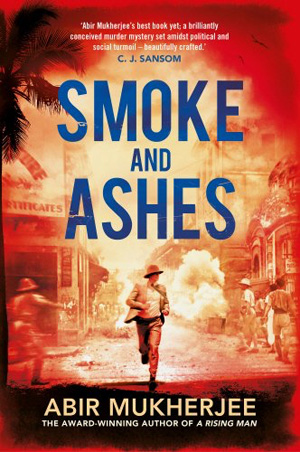
Wyndham is an ex-Scotland Yard detective and a veteran of World War I, scarred by survivor guilt and the loss of his wife to the influenza that killed so many. It’s 1921 and he’s been in India for two years now. Like Sherlock Holmes before him, he enjoys recreational drugs and has become dangerously dependent on opium. His nights are wiped out under the influence and his days are spent struggling to function through his cravings.
However, it is a visit to an opium den that puts Wyndham on his next crime case when he discovers a dying man with his eyes gouged out and a knife in his chest. Stumbling from the scene, Wyndham disposes of any evidence that he was there, as his presence in the den must be kept secret from his superiors.
The next day he and his ultra bright Indian sergeant Surrender-Not Bannerjee (Surendranath) are sent to investigate the murder of an Indian Christian military nurse who is found with similar ritualistic injuries on the riverbank. Wyndham can’t tell anyone about the same modus operandi, as he fears his adversaries in the brutal military intelligence Section H have his cards marked already. Before long he discovers a sinister link between the murders at the heart of the British rule.
To make matters worse on the personal front, his love-interest, Annie Grant, who previously helped him begin to overcome the grief of losing his wife, has taken up with a flash American multi-millionaire tea trader. His life is a mess.
There are more than the murders for Wyndham and Surrender-Not to deal with. The freedom movement is gathering pace in Calcutta. A friend of the sergeant’s family, Chitta-Ranjan Das, a real life independence leader, has joined Gandhi as his chief lieutenant in Bengal and is planning a mass non-violent demonstration and rally. And, this is all days before the arrival of the Prince of Wales, the future Edward VIII, which is guaranteed to fuel the unrest further. The British are terrified that the publicity surrounding any trouble during the prince’s visit will be seen around the world.
Wyndham is ordered to deliver an ultimatum to Das on behalf of the Viceroy to cancel the protest or have his volunteer organisations outlawed. What actually happens is that Das and Wyndham discuss the matter with cordial good-humour as fellow gentlemen. Das is committed to provoking a reaction and Wyndham wants a quiet life. The policeman has a lot more time for Das than the military thugs and bent cops he encounters in the Imperial Police Force and the native units. All Wyndham can do is hope there is no mass bloodshed at the hands of the British military. He understands that the actual threat is from the downtrodden millions who could rise up instead of praying.
Questions have often been asked about whether Wyndham is a little too enlightened towards the plight of the native population for an educated British man of his time. There are a few occasions when he refers to Indians as the great unshod and unwashed etc but any racist thoughts he keeps to himself. Recently Mukherjee addressed this at Newcastle Noir, saying Wyndham is a man out of his time so as to avoid the traits we don’t want to see in a protagonist.
What makes these books rise above many others to acclaim is how Mukherjee tells the compelling story of this neglected and fascinating period of Anglo-British history in a cracking rollercoaster style with wit and credibility.
For crime fiction with a completely different tone, try Vaseem Khan’s Baby Ganesh books, or something by Brian Stoddart. Read our 2015 interview with Abir Mukherjee here.
Harvill Secker
Print/Kindle/iBook
£9.35
CFL Rating: 5 Stars